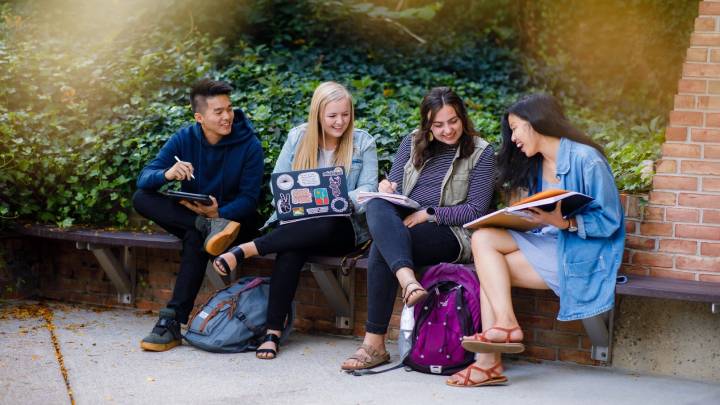
There are many ways to get involved in our mathematics and statistics community and gain more experience in math outside the traditional classroom setting. From attending weekly Colloquium lectures and Problem Solving Club meetings to competing in mathematics competitions and engaging in research with faculty mentors, you can deepen your study through the mathematics program at Calvin.
Math-News
For email updates about department events, grading and tutoring opportunities, mathematics competitions, conferences, and other news items that reach our department, subscribe to math-news at http://list.calvin.edu/mailman/listinfo/math-news.
Colloquium
The Mathematics and Statistics Colloquium provides a weekly opportunity for you to hear presentations by students, faculty and visiting mathematicians from industry and academia. The Colloquium meets most weeks during the academic semesters on Thursday afternoons from 3:05-3:55 p.m. Colloquium organizers for 2025-2026 are Prof. Moseley and Prof. Pruim. For the most recent colloquium schedule, see https://calvin-mathematics-colloquium.netlify.app/.
Advising
Many students find their way to mathematics through another major that requires strong mathematical skills. Some are surprised to learn that after the requirements of the other major, it may take only 1-2 more courses to earn a mathematics minor. For typical pathways to a minor, talk with your current instructor or see our advising guide.
Problem-Solving Club
Calvin's Problem-Solving Club is an informal gathering of mathematics students who are interested in solving problems and presenting their solutions to one another. The club meets weekly, typically in late afternoon. If you may be interested in joining the Problem Solving Club, contact Prof. Moseley.
Competitions
As a math student at Calvin, you can participate in statewide and national mathematical competitions. Our students regularly take part in the Lower Michigan Mathematics Competition and the William Lowell Putnam Mathematical Competition.
Research
As a mathematics and statistics student at Calvin, you may participate in paid summer research projects via the STEM Division Research Program. In recent years, students have worked with faculty on projects in the statistical analysis of traffic patterns, mathematical modeling in biology, kinematic work spaces for robotic arms, polygonal chains and hyperbolic tessellations. Other Calvin students have participated in summer research projects at universities such as Northern Arizona, Oregon State and Brigham Young, and at the National Security Agency. For advanced coursework and a unique international experience, Calvin students sometimes choose to participate in Budapest Semester in Mathematics alongside students from other liberal arts institutions in the U.S.
Reading Room
The Reading Room (NH-282) is a great place for students to gather for relaxation between classes or to work with classmates. This space serves as hub for impromptu office hours or group study sessions as well as activities like problem-solving club and pi day celebration. Before a test or exam, the floor-to-ceiling whiteboards are often filled with proofs, equations, and graphs.
Menger Build
Our North Hall alcoves provide additional study space with whiteboards and display reproductions of work by Dutch artist M.C. Escher. More noticeable in the department, however, is our Level 4 Build of the Menger Sponge (constructed entirely from business cards!) located along the corridor to the Science Building. To learn more about this fractal project see https://www.crcna.org/news-and-events/news/calvin-college-will-build-fractal.
Grading, Assistants, Tutors
Some students work for the department as graders or classroom assistants. To inquire about such opportunities, contact Zach Abbott. Other students serve as tutors in the campus-wide tutoring program run by the Center for Student Success; this includes weekly Calculus Study Sessions and Statistics Study Sessions. To inquire about these opportunities, contact Emily Bosscher.






